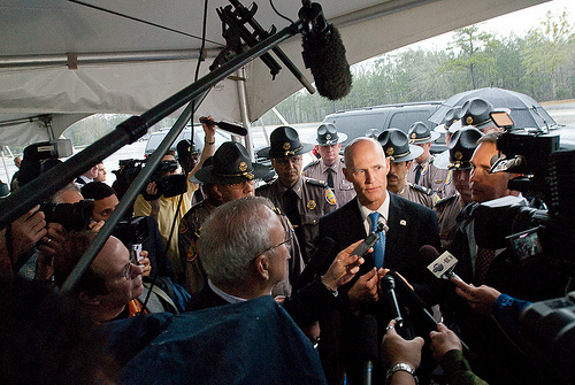
Gov. Rick Scott and CFO Jeff Atwater discuss PIP reform in Florida. (Photo courtesy of Rick Scott.)
By Howard Goodman
Florida Center for Investigative Reporting
Business interests ran up the scoreboard in the waning minutes of the 2012 legislative session.
With the 60-day session rushing to a close at midnight Friday, lawmakers pushed through tax relief for the business sector that will total some $750 million this year and more than $2.5 billion over the next three years.
The Tampa Bay Times ran a good list of the tax breaks here.
The tax reductions will give Gov. Rick Scott a real-life test of his economic theories: let businesses hold onto more of their money, the idea goes, and they’ll do more hiring. When the governor was elected in 2010 as a tea party favorite, he promised to create 700,000 jobs through smaller-government policies rooted mainly in big cuts in business taxes.
“We are going to make sure that the businesses in Florida out-compete any businesses in the world,” Scott said after the session ended.
Democrats, badly outnumbered and powerless in both houses, could only decry the budget as an attack on working families. Rep. Charles Chestnut, of Gainesville, called it “a far cry from the promises heard earlier this session about how the Legislature would focus on job creation.”
The Miami Herald published a good summary of the session’s pluses and minuses here.
After cutting school spending by $1.3 billion last year, plunging per-pupil spending to its lowest level in six years, the legislature made good this year on one of Scott’s most publicized goals: to add $1 billion to public schools.
And he won approval for another priority: revamping the state’s mandatory $10,000 personal injury protection (PIP) for drivers.
It marks a big improvement for a guy who, less than a year in office, polled as America’s least-liked governor.
This time he played a more accommodating game, set sights on smaller goals, and fared much better.
“Scott emerges from the legislative session better positioned than last spring,” the Sarasota Herald-Tribune says, “good news for Republicans heading into the presidential race and the general election campaign.”
